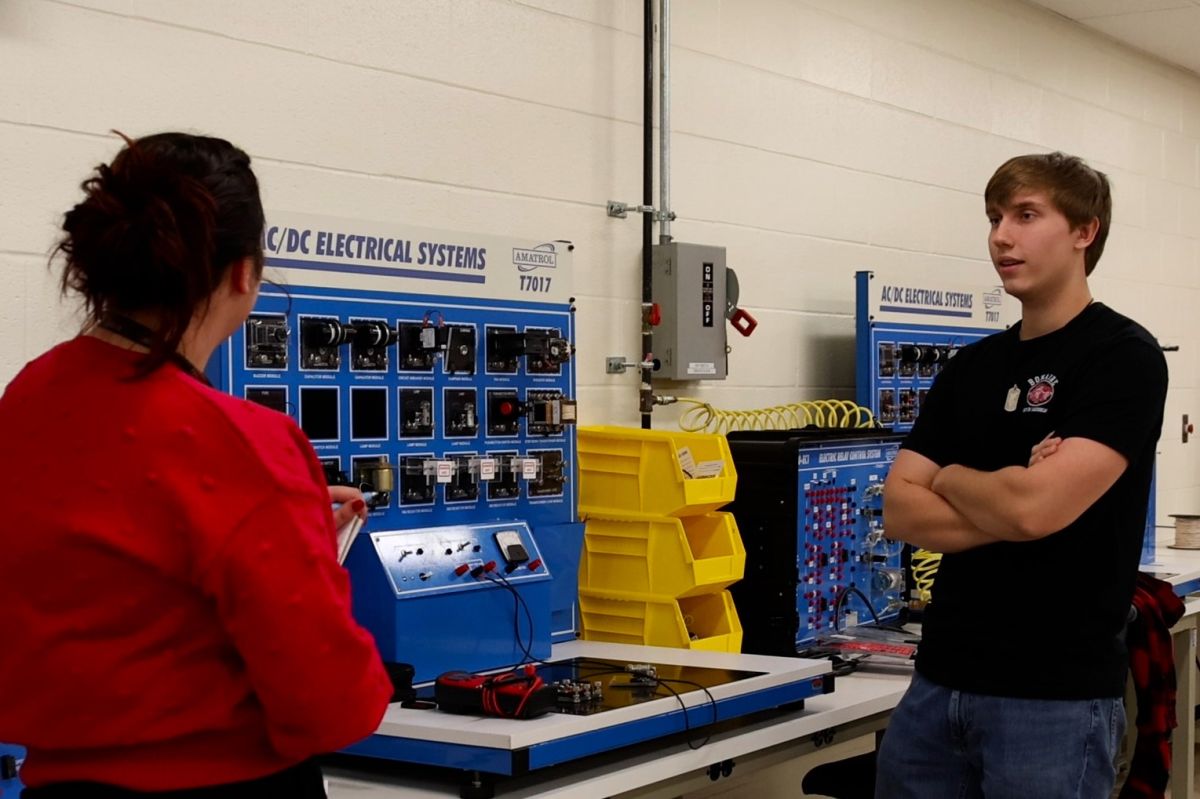
Colton Martin, a Workforce Ready Grant recipient, demonstrates how to use a circuit board at Ivy Tech Community College Bloomington. (Devan Ridgway, WTIU)
Colton Martin knows his way around this circuit board.
He said it’s a simple switch and lamp — just like the ones he set up in his Ivy Tech Community College Bloomington classes. Martin wants to do this kind of hands-on work, and he's on his way to becoming an electrician.
“I like to work,” Martin said. “I want to do something immediately as I get out of high school and out of college, if I can.”
With a Workforce Ready Grant from the state, he’s earning an Industrial Technology Certificate focusing on electronics for free. The grant covers Martin’s tuition and fees.
Career and technical education programs such as Martin’s program at Ivy Tech partnered with the state for the Next Level Jobs program. The program was created to fill gaps in healthcare, skilled trades, manufacturing, education, computer science and other industries. It’s specifically for adults who graduated high school but have no college degree.
Martin said he chose his certificate program because he wanted a stable foundation in the electrical field.
“It always just has interested me more than math and English and those other classes,” Martin said. “I still love them, and I'm still good at them, but I would like to put my brain more into a trade field, if that's possible.”
Read more: Lumina: Indiana slightly improves higher ed attainment
Indiana leaders estimate there are tens of thousands of jobs Hoosiers can fill with a little more education through certificates. More than 33,000 Hoosiers have earned the Workforce Ready Grant, according to state reports.
"We have a lot of high-wage opportunities here in Indiana, and there's job openings, but we need to connect individuals who want to work in those areas with those careers,” said Sarah Cote, Ivy Tech Bloomington Dean of the School of Advanced Manufacturing, Engineering and Applied Sciences.
Indiana Gov. Mike Braun’s proposed budget includes more than $34 million for employers in the Next Level Jobs program and $12 million for the Workforce Ready Grant.
“On economic development, we're taking a new approach, focused on building skills for Hoosiers currently in the workforce to match high value, high wage jobs that employers need to fill,” Braun said in his State of the State address.
About a third of Hoosiers meet the education requirements for the Workforce Ready Grant. To get the funding, prospective students complete a short survey showing what they want to do and when they can take classes.
Recipients must enroll in approved programs, and there are more than 200 throughout the state.
Cote said the requirements for dependent students and independent students are different. At Ivy Tech, students dependent on their parents may have to take four classes per semester. But it’s more flexible for independent students — who are usually older adults.
“At Ivy Tech, the majority of our classes now are eight weeks,” Cote said. “So, we run two eight-week terms within a semester. They can be taking one class at a time and still be eligible for Workforce Ready Grants.”
Some Ivy Tech certificates require internships or job shadowing, but Cote said all students are encouraged to get real-life experience.
All Ivy Tech programs are developed with advisory boards made up of industry partners, Cote said, and some programs are even designed for those partners.
“We have a very strong connection with our industry partners,” Cote said. “We know where the needs are. We know where the jobs are.”
Read more: Indiana’s ambitious plan to boost apprenticeships ‘will be challenging,’ per new report
After completing their certificates, some students like Martin go on to earn other certification or more advanced degrees.
“'I’ll have to do my next year, only a couple months of next year, and then I will have my technical certificate in this program,” Martin said. “And then, I'll be starting my associate’s [degree] afterwards.”
Students who earn associate degrees tend to go further in their career than students who earned certificates, Cote said.
"A lot of our students — I can speak more for the advanced manufacturing side — they're going to start out as technicians, operators, some early programming if they're in robotics,” Cote said. “But then, as their time in the career continues on, and they gain more of that hands-on experience, they'll be able to advance beyond that in many cases.”
Aubrey is our higher education reporter and a Report For America corps member. Contact her at aubmwrig@iu.edu or follow her on X @aubreymwright.











